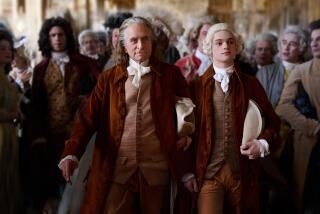John Hope Franklin dies at 94; scholar wrote pivotal text on blacks in U.S. history
John Hope Franklin, a Duke University historian and scholar of life in the South and the African American experience in the United States, died Wednesday. He was 94.
Duke spokesman David Jarmul said Franklin died of congestive heart failure at the university’s hospital in Durham, N.C.
As an author, his book “From Slavery to Freedom” was a landmark integration of black history into American history. As a scholar, his research helped Thurgood Marshall and the NAACP legal defense team win Brown vs. Board of Education, the 1954 Supreme Court case that outlawed the doctrine of “separate but equal” in the nation’s public schools.
“It was evident how much the lawyers appreciated what the historians could offer,” Franklin later wrote. “For me, and I suspect the same was true for the others, it was exhilarating.”
Franklin broke numerous color barriers. He was the first black department chairman at a predominantly white institution, Brooklyn College; the first black professor to hold an endowed chair at Duke University; and the first black president of the American Historical Assn.
Above all, he documented how blacks had lived and served alongside whites from the nation’s birth. Black patriots fought at Lexington and Concord, Franklin pointed out in “From Slavery to Freedom,” published in 1947. They crossed the Delaware with Washington and explored with Lewis and Clark. The text sold million of copies and remains required reading in many college classrooms.
Late in life, Franklin chaired President Clinton’s Initiative on Race and received more than 100 honorary degrees, the NAACP’s Spingarn Medal and, in 1995, the Presidential Medal of Freedom, the nation’s highest civilian honor.
In his later years, Franklin spent more time nursing orchids in the greenhouse behind his home than in libraries. He fell in love with the flowers because “they’re full of challenges, mystery” -- the same reasons he fell in love with history.
Franklin was born Jan. 2, 1915, in the all-black town of Rentiesville, Okla. His parents had moved there thinking that separation from whites would mean a better life for their young family.
His father, Buck, was an attorney. His mother, Mollie, a teacher, began taking him to school with her when he was 3. He could read and write by 5; by 6, he first became aware of the “racial divide separating me from white America.”
Franklin, his mother and sister Anne were ejected from a train when his mother refused the conductor’s orders to move to the overcrowded “Negro” coach. As they trudged through the woods back to Rentiesville, young John Hope began to cry.
His mother pulled him aside and told him, “ ‘There was not a white person on that train or anywhere else who was any better than I was,’ ” he recalled. “She admonished me not to waste my energy by fretting but to save it in order to prove that I was as good as any of them.”
Franklin attended historically black Fisk University in Nashville, where he met Aurelia Whittington, who would be his wife, editor and rock for 58 years until her death in 1999. He planned to follow his father into law, but the lively lectures of a white professor, Ted Currier, persuaded him that history was his field. Currier borrowed $500 to send Franklin to Harvard University for graduate studies.
His doctoral thesis was on free blacks in antebellum North Carolina, and his wife spent part of their honeymoon in Washington, D.C., at the Census Bureau, helping him finish his research. Franklin himself had to wait three days at the North Carolina state archive for a separate room to be prepared to segregate him from white scholars working there. But the resulting work, “The Free Negro in North Carolina, 1790-1860,” earned Franklin his doctorate and, in 1943, became his first published book.
Four years later, he completed his seminal work, “From Slavery to Freedom,” and accepted a job at Howard University, beginning his long academic career. He was a visiting professor at some of the leading universities in the country, including Harvard, Cornell and UC Berkeley.
Some of his greatest moments of triumph were marred by bigotry.
His joy at being offered the chair of the Brooklyn College history department in 1956 was tempered by his difficulty getting a loan to buy a house in a “white” neighborhood.
Franklin was in New York in 1985 to receive the Clarence Holte Literary Prize for his biography of historian George Washington Williams, a 40-year project for which he was a runner-up for the Pulitzer Prize. The next morning, he and his wife were unable to hail a taxi in front of their hotel.
He often regarded his country as an exasperated relative, frustrated by racism’s stubborn power, yet refusing to give up on it entirely. “I want to be out there on the firing line, helping, directing or doing something to try to make this a better world, a better place to live,” Franklin told the Associated Press in 2005.
In 1993, President Clinton honored Franklin with the Charles Frankel Prize, recognizing scholarly contributions that give “eloquence and meaning . . . to our ideas, hopes and dreams as American citizens.”
More to Read
Start your day right
Sign up for Essential California for the L.A. Times biggest news, features and recommendations in your inbox six days a week.
You may occasionally receive promotional content from the Los Angeles Times.






